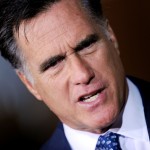
Mitt Romney is wading into a new policy arena—the nation’s education system—as he broadens his focus to appeal to general election voters still getting to know President Barack Obama’s likely opponent.
The presumptive Republican presidential nominee, who has been reluctant to stray far from economic issues, is expected to outline a proposal for improving education in a speech May 23 at the U.S. Chamber of Commerce in Washington, D.C.
Romney has offered few details for his plans on several key policy areas—foreign policy, health care, and education among them. He attacked Obama’s education policy while speaking to donors in New York City on May 22, previewing themes likely to play prominently in his speech the next day.
“This president receives the lion’s share of funding from organized labor, and the teachers’ unions represent a massive source of funding for the Democratic Party,” Romney said. “The challenge with that is when it comes to actual reform to make schools better for our kids, they talk a good game, but they don’t do it.”
He continued, “If I’m president of the United States, instead of just giving lip service to improving our schools, I will actually put the kids first and the union behind in giving our kids better teachers, better options, and better choices for a better future.”
Romney’s attempts to link Obama with organized labor ignore the fact that representatives from the nation’s largest teachers unions have been unhappy with many of the president’s aggressive school-reform proposals, including his support for charter schools and using student achievement data to evaluate teachers.
The message is consistent for the Romney campaign, which regularly heaps criticism on the Democratic president’s policies but offers only a vague road map for what Romney would do.
Romney’s regular criticism of labor unions comes with some risk, because it threatens to alienate voters in Rust Belt states like Michigan, Ohio, and Pennsylvania where a close election might be decided.
In advance of the speech, Romney on May 22 announced a team of education policy advisers that includes former Education Secretary Rod Paige and other officials from President George W. Bush’s administration. Paige is among several prominent opponents of teachers’ unions on the panel. As education secretary in 2004, he labeled the National Education Association a “terrorist organization.”
Romney’s positions on education have evolved over time. He once supported abolishing the Education Department but reversed that position as a presidential candidate in 2007. At the time, he said he came to see the value of the federal government in “holding down the interests of the teachers’ unions” and putting kids and parents first.
Romney also changed his position on the Bush-era education overhaul known as No Child Left Behind. He said he supported the law as a candidate in 2007, but he has since generally come out against the policy many conservatives see as an expansion of the federal government.
Romney continues to support the federal accountability standards in the law, however. And he has said the student testing, charter-school incentives, and teacher evaluation standards of Obama’s “Race to the Top” competition “make sense,” although the federal government should have less control over education. The campaign in recent days has emphasized his support for charter schools while governor of Massachusetts, a theme likely to play out in his May 23 address.
The speech represents Romney’s first public event in four days. Working to close Obama’s cash advantage, he’s coming off a three-day fundraising swing in the New York area that his chief finance aide said netted $15 million.
The education speech follows a relatively quiet phase for the Romney campaign, which has focused on fundraising but usually delivers one major address a week. Most of his recent speeches, however, have focused on the economic themes that have so far defined his campaign.
For more education policy news, see:
The bait-and-switch tactic driving Georgia’s education debate
Report calls for more broadband access in schools
‘Dear President Obama … We can’t test this country into excellence’
- ‘Buyer’s remorse’ dogging Common Core rollout - October 30, 2014
- Calif. law targets social media monitoring of students - October 2, 2014
- Elementary world language instruction - September 25, 2014

